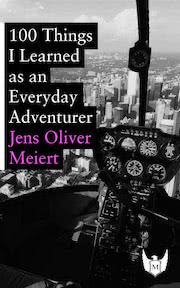Life’s Golden Rules
Published on August 4, 2016 (↻ February 5, 2024), filed under Philosophy (RSS feed for all categories).
From all my cheeky laws and a number of absolutistic posts you already know I have a thing for dramaturgy. The same here: While I’m not entirely sure about the validity (and symmetry) of the so-called Golden Rule in a sense that I’d like to think through it before fully agreeing to its otherwise apparent use, it seems to me that there’s indeed something along the lines of a universal “quid pro quo.”
What it is, and we would not only have the Golden Rule but also the Bible (“love your neighbor as yourself,” Mark 12:31), and perhaps even the Law of Attraction to fall back on, I ran into maybe a decade ago. I had even recognized it as important, but only now realize how, if true, it would be an extremely potent (and fascinating) twist on how to look at the connection between individual and collective reality. The statement, now, as follows:
If you want to know what you think of yourself, then ask yourself what you think of others, and you will find your answer.
—Jane Roberts: The Seth Material.
I welcome you to read on just as I had read on, albeit marking the quote; on the other hand, what The Seth Material then did not elaborate much on, we’ll take a closer look at. At first I’d like to play with rephrasing the statement.
Shortened: “If you want to know what you think of yourself, then ask yourself what you think of others.”
Shorter: “To know what you think of yourself, ask what you think of others.”
Turned around: “What you think of others you think of yourself.” (I wondered if that really follows logically but haven’t found an issue with this; P as a sufficient condition for Q; Q as a necessary condition for P is my reasoning here.)
(It does not seem to follow logically, however, to invert the statement: “To know what you think of others, ask what you think of yourself” would only work if the original had said “If and only if…” Correct me if I’m wrong.)
What is so interesting and powerful about the original statement, if true as assumed, is that it gives us an interesting path to self-exploration. “To know what you think of yourself, ask what you think of others.” That is one straight way to find out.
The statement has an implication that I find even more interesting if one finds oneself struggling, an implication I’ve been toying with as of late: “To think well of yourself, think well of others.” (For, per the original quote, it follows that thinking well of others implies thinking well of oneself. Note again how we could not invert this statement, for we’re dealing with a conditional, not a biconditional.)
What you make a rule, and what you make golden, I’m not overly concerned about. Both “To know what you think of yourself, ask what you think of others” and “To think well of yourself, think well of others” look powerful to me. Anything else now I’ll evade as conveniently as I’ve done on other occasions; on this site we all think, together.
About Me

I’m Jens (long: Jens Oliver Meiert), and I’m a frontend engineering leader and tech author/publisher. I’ve worked as a technical lead for companies like Google and as an engineering manager for companies like Miro, I’m close to W3C and WHATWG, and I write and review books for O’Reilly and Frontend Dogma.
I love trying things, not only in web development (and engineering management), but also in other areas like philosophy. Here on meiert.com I share some of my views and experiences.
If you’d like to do me a favor, interpret charitably (I speak three languages, and they do collide), yet be critical and give feedback for me to fix issues, learn, and improve. Thank you!
Read More
Maybe of interest to you, too:
- Next: 10 Photos III
- Previous: The Bio Enhancement Dilemma
- More under Philosophy
- More from 2016
- Most popular posts
Looking for a way to comment? Comments have been disabled, unfortunately.

Find adventure anywhere? Try 100 Things I Learned as an Everyday Adventurer (2013). During my time in the States I started trying everything. Everything. Then I noticed that wasn’t only fun, it was also useful. Available at Amazon, Apple Books, Kobo, Google Play Books, and Leanpub.
